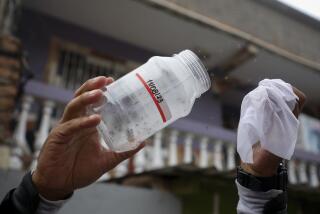Firm Hopes to Clean Up With Grease-Eating Bacteria : Technology: Tiny gobblers feed on waste in drains until it--and they--are gone.
- Share via
CAMPBELL, Calif. — Little “critters” with big appetites are voraciously consuming the unspeakable in dank drains and troubled septic tanks for profit and a better environment.
No, these are not Teenage Mutant Ninja Turtles. They are bacteria, 65 trillion to the ounce, selectively bred to eat grease or fatty wastes in restaurant drains. Tiny cousins, a slightly different bacterial strain, rise to a feeding frenzy when dropped down a toilet and flushed into the dark underworld of septic tanks.
The little gobblers, brainchildren of Melvin B. (Bud) McMahon, founder of Bio-Care Inc., are becoming big business.
“It’s the solution to ongoing restaurant problems with clogged drains,” said Bob Larive, who in early March took over as chairman and chief executive officer at Bio-Care. “Rather than using caustic and mechanical procedures to keep the drains clear, our little critters get the job done.”
Projected revenues from the sale of the bacteria to more than 200 accounts in the San Francisco Bay Area and from the sale of franchises around the country will reach $3 million in 1990, Larvie said.
Launched four years ago on a $5 million investment through private loans and the W.R. Grace venture capitalist firm in nearby Cupertino, Bio-Care should be in the black within two more years, Larvie said.
“We’ve sold 14 franchises in Arizona, Colorado, Hawaii and California as well as in Singapore, the Philippines and Canada,” he said.
“These little critters have voracious appetites. They are seletively bred to eat the stuff found in drains and in septic tanks.”
“They feed on waste products until the waste is gone,” added McMahon, 53.
“They literally eat themselves to death. When there’s no waste left to eat, the bacteria die and disappear, leaving no waste matter behind.
“What they actually do is metabolize grease and other fats and oils that clog drains and convert them into water, carbon dioxide and minute amounts of harmless residue.”
The Bio-Care bacteria are non-toxic and cannot harm plumbing in any way, McMahon said. They have been approved by the Food and Safety Inspection Service of the U.S. Department of Agriculture.
“People put dumb stuff down the drains,” said Steve Lee, manager of the Original Crabhouse restaurant in San Jose. “When you’re trying to help guests, you don’t want to be rolling up your sleeves and getting in the toilets.”
After being assured that the Bio-Care grease-eating bugs are environmentally sound, Lee contracted with the company for a regular maintenance service.
For $235 a month, a Bio-Care employee takes care of all maintence involving drains and toilets. Once a week he dumps trillions of the bacterial grease eaters into the system, where they gobble up waste until until it is gone or until caustic cleaning agents such as dishwashing soaps or solvents kill them off.
“I was spending more than that in grease trap pumping and calling people out to do preventive maintence,” Lee said.
“Now, they (Bio-Care) come every Wednesday morning and go through basically my whole system. I haven’t had a grease trap problem at all with them.”
Total maintenace is the future for his company, McMahon said, noting that there are more than half a million restaurants in the United States alone.
Managers in the hospitality industry “don’t want to worry about the drains, the toilets and whether there are hand towels in the bathrooms,” he said. “We can do that for them at a reasonable cost, leaving them time to manage the customer service end of their businesses.”
More to Read
Inside the business of entertainment
The Wide Shot brings you news, analysis and insights on everything from streaming wars to production — and what it all means for the future.
You may occasionally receive promotional content from the Los Angeles Times.










